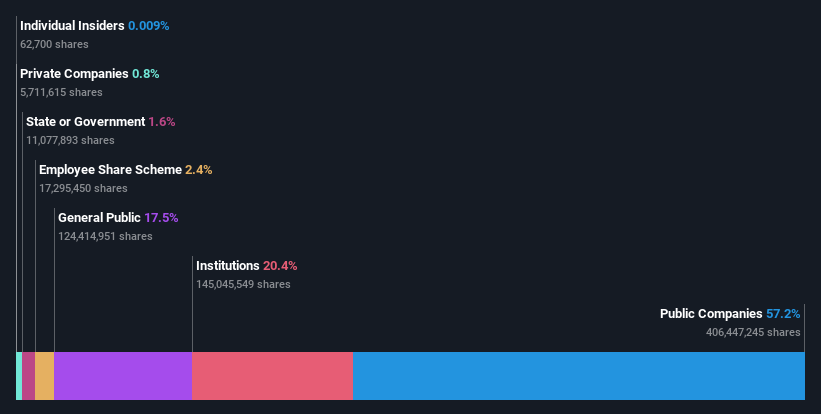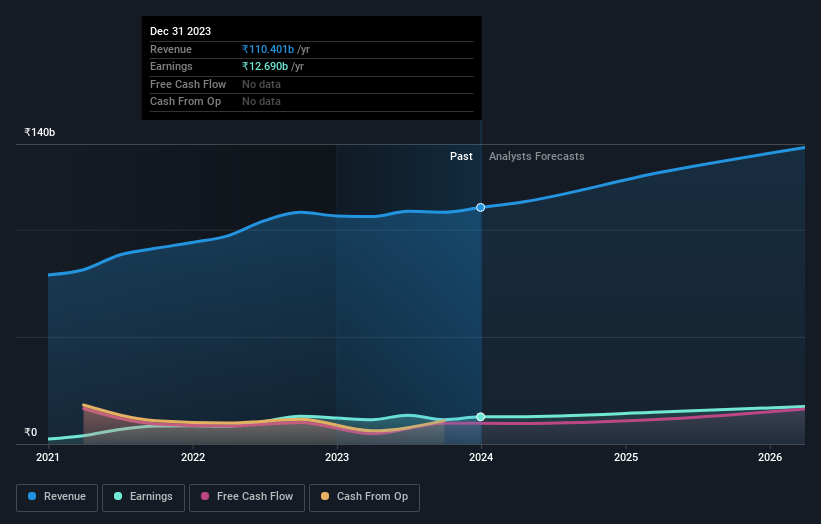Stock Analysis
Public companies who have a significant stake must be disappointed along with institutions after United Spirits Limited's (NSE:MCDOWELL-N) market cap dropped by ₹36b

Key Insights
- The considerable ownership by public companies in United Spirits indicates that they collectively have a greater say in management and business strategy
- 57% of the company is held by a single shareholder (Diageo plc)
- 20% of United Spirits is held by Institutions
To get a sense of who is truly in control of United Spirits Limited (NSE:MCDOWELL-N), it is important to understand the ownership structure of the business. We can see that public companies own the lion's share in the company with 57% ownership. Put another way, the group faces the maximum upside potential (or downside risk).
While institutions who own 20% came under pressure after market cap dropped to ₹816b last week,public companies took the most losses.
In the chart below, we zoom in on the different ownership groups of United Spirits.
Check out our latest analysis for United Spirits

What Does The Institutional Ownership Tell Us About United Spirits?
Many institutions measure their performance against an index that approximates the local market. So they usually pay more attention to companies that are included in major indices.
As you can see, institutional investors have a fair amount of stake in United Spirits. This can indicate that the company has a certain degree of credibility in the investment community. However, it is best to be wary of relying on the supposed validation that comes with institutional investors. They too, get it wrong sometimes. It is not uncommon to see a big share price drop if two large institutional investors try to sell out of a stock at the same time. So it is worth checking the past earnings trajectory of United Spirits, (below). Of course, keep in mind that there are other factors to consider, too.

United Spirits is not owned by hedge funds. The company's largest shareholder is Diageo plc, with ownership of 57%. With such a huge stake in the ownership, we infer that they have significant control of the future of the company. In comparison, the second and third largest shareholders hold about 2.4% and 2.1% of the stock.
Researching institutional ownership is a good way to gauge and filter a stock's expected performance. The same can be achieved by studying analyst sentiments. There are plenty of analysts covering the stock, so it might be worth seeing what they are forecasting, too.
Insider Ownership Of United Spirits
The definition of an insider can differ slightly between different countries, but members of the board of directors always count. The company management answer to the board and the latter should represent the interests of shareholders. Notably, sometimes top-level managers are on the board themselves.
I generally consider insider ownership to be a good thing. However, on some occasions it makes it more difficult for other shareholders to hold the board accountable for decisions.
Our information suggests that United Spirits Limited insiders own under 1% of the company. As it is a large company, we'd only expect insiders to own a small percentage of it. But it's worth noting that they own ₹72m worth of shares. Arguably recent buying and selling is just as important to consider. You can click here to see if insiders have been buying or selling.
General Public Ownership
With a 18% ownership, the general public, mostly comprising of individual investors, have some degree of sway over United Spirits. This size of ownership, while considerable, may not be enough to change company policy if the decision is not in sync with other large shareholders.
Public Company Ownership
We can see that public companies hold 57% of the United Spirits shares on issue. This may be a strategic interest and the two companies may have related business interests. It could be that they have de-merged. This holding is probably worth investigating further.
Next Steps:
It's always worth thinking about the different groups who own shares in a company. But to understand United Spirits better, we need to consider many other factors. Take risks for example - United Spirits has 1 warning sign we think you should be aware of.
But ultimately it is the future, not the past, that will determine how well the owners of this business will do. Therefore we think it advisable to take a look at this free report showing whether analysts are predicting a brighter future.
NB: Figures in this article are calculated using data from the last twelve months, which refer to the 12-month period ending on the last date of the month the financial statement is dated. This may not be consistent with full year annual report figures.
Valuation is complex, but we're helping make it simple.
Find out whether United Spirits is potentially over or undervalued by checking out our comprehensive analysis, which includes fair value estimates, risks and warnings, dividends, insider transactions and financial health.
View the Free AnalysisHave feedback on this article? Concerned about the content? Get in touch with us directly. Alternatively, email editorial-team (at) simplywallst.com.
This article by Simply Wall St is general in nature. We provide commentary based on historical data and analyst forecasts only using an unbiased methodology and our articles are not intended to be financial advice. It does not constitute a recommendation to buy or sell any stock, and does not take account of your objectives, or your financial situation. We aim to bring you long-term focused analysis driven by fundamental data. Note that our analysis may not factor in the latest price-sensitive company announcements or qualitative material. Simply Wall St has no position in any stocks mentioned.
About NSEI:MCDOWELL-N
United Spirits
United Spirits Limited manufactures, purchases, and sells alcoholic beverages and other allied spirits in India and internationally.
Flawless balance sheet with moderate growth potential.

